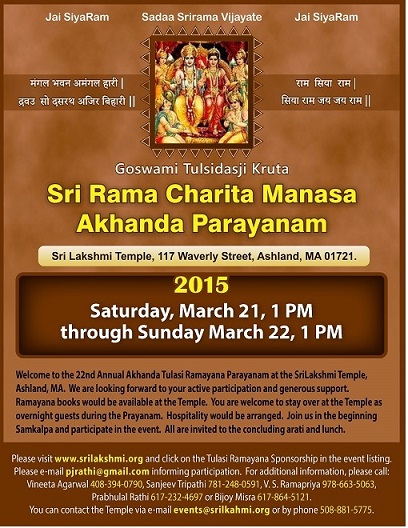Contribute
| S’rī’RÄmacaritamÄnasa Reading Event At SriLakshmi Temple |
Bijoy Misra
03/11/2015
There is no theory for the origin of words and their sound quality. It is not known how the word “RÄma†came to be associated with peace and tranquility. It could be yogic discovery of sound experiments in very early period of Indian history. Like all unexplainable material and information, the poets imagine that such sound phrases were communicated by the divine sage NÄrada to people on earth. In time, RÄma has become a word representing human will and steadfastness, beautifully rendered by poet VÄlmÄ«ki in his majestic work of RÄmÄyaṇa. The story of RÄma has been the story of Indian society through this epic. Everything good in human values has been associated with RÄma through this magnificent creation of the personality of RÄma. While VÄlmÄ«ki’s RÄma is mysterious, larger than life and ideal in his attitude, saint poet Tulasi Dasa saw the potential of using RÄma’s story to create a renaissance in Indian society while the values were eroding with the establishment of the Mughal rule. A musician as he was, he sang his poems himself accompanied with instruments in association with other community singers. From the edifice of VÄlmÄ«ki’s literary creation, he made it a family-oriented social epic such that the men and women can learn from it. He saw the effulgence of SÄ«tÄ as a woman and coined the phrase “S’rÄ« RÄma†where the RÄma’s virtues are endowed by SÄ«tÄ’s humility and devotion. Tulasi Dasa’s S’rÄ« rÄmacaritamÄnasa created when the poet was already in his ripe old age has been the staple of Indian religious faith ever since it was produced. Among the contributions that Tulasi Dasa made is the reinvocation of “RÄma†as a sound unit and calling the recitation of the name itself as auspicious. While people may not have time to appreciate the glory of RÄma’s life and activities, they can certainly attain strength by invoking the phrase which has the yogic power built in it as discovered in the early times. The recitation of the name RÄma has ever since been a companion for millions of people in India in their times of need and despair or to recover from the shackles of oppression and subjugation. The recitation has become a mantra for the new society where people had to work in far-away places in strange lands in still stranger circumstances. “RÄma†has been a support in travel, in battles, in crisis, in the periods of loneliness, in sickness and at the time of death. We invoke “RÄma†to guard us in everything we do including this writing. S’rÄ« rÄmacaritamÄnasa recitation in Boston began in 1975 though the diligent efforts of Sri Prabhulal Rathi and his wife Srimati Drupadi Rathi who had migrated from Pakistan. They were helped by Mrs Sarla Dayal, who wanted to sustain herself in the new country through the principles of Tulasi’s Manasa. The organization of a public reading by all was initiated in 1994 in the local SriLkashmi Temple and we are in its 22nd year. This year’s dates are March 21 and 22 and all are invited to participate in this festival recitation of S’rÄ« rÄmacaritamÄnasa . The flyer for the event is given in the sidebar. Please support the public cause by calling the Temple at 508-881-5775. Please contact Sri Rathi at pjrathi@gmail.com in case you wish to share time in reading. The reading will continue for twenty four hour beginning at 1 PM on March 21. Hospitality will be provided in the Temple. Please be at the Temple at noon time on March 21 to help us in organizing the event. A public lunch would be offered on March 22. I on behalf of the Ramayana team and the Temple solicit your support. Please do encourage children and youth to join and understand the faith. We explain as much as we can through the available time. The faith is more empowerment and association than a mechanical observance. The faith is our support in the world. As Tulasi’s Hanuman says, let me finish by saying “Jai S’rÄ«RÄmaâ€. 
You may also access this article through our web-site http://www.lokvani.com/

